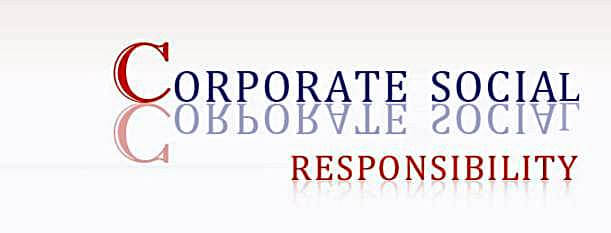Corporate Social Responsibility: The Rising Trend? – By H. Arshad
Traditionally CSR (corporate social responsibility) has been defined in United States in terms of a philanthropic model. They donate a certain share of the profits to charitable causes. It could be said as tainting the act for the company to receive any benefit from the giving. Whereas, in European model social responsibility becomes an integral part of the wealth creation process – which if managed properly it is believed to enhance the competitiveness of business and maximise the value of wealth creation to society.
Different perceptions are seen from different societies across the world like in Africa CSR is about capacity building for sustainable livelihoods. It respects cultural differences and finds the business opportunities in building the skills of employees, the community and the government though CSR is about giving business back to society; what is understood in South East Asia.
The World Business Council for Sustainable Development in its publication “Making Good Business Sense” by Lord Holme and Richard Watts, used the following definition; “Corporate Social Responsibility is the continuing commitment by business to behave ethically and contribute to economic development while improving the quality of life of the workforce and their families as well as of the local community and society at large”
So you label it a philanthropic exercise or a responsible society oriented business strategy one thing that is for sure; the pressure on business to play a role in social issues will continue to grow. Over the last ten years, those institutions which have grown in power and influence have been those which can operate effectively within a global sphere of operations. Those institutions which are predominantly tied to the nation state have been finding themselves increasingly frustrated at their lack of ability to shape and manage events. These include national governments, police, judiciary and others.
There is a growing interest, therefore, in businesses taking a lead in addressing those issues in which they have an interest where national government have failed to come up with a solution. The focus Unilever-UK had on supporting a sustainable fisheries approach is one example. Using the power of their supply chain, such companies are placed to have a real influence. National governments negotiating with each other have come up with no solutions at all, and ever-depleting fish stocks. That is not to say businesses will necessarily provide the answers – but awareness is growing that they are occasionally better placed to do so than any other actors taking an interest.
And believe it or not this is all because of proper image building and appropriate employment of tools of CSR; many leading organizations have stood against the cutting edge allegations against them. For instance, Nike has become one of those global companies targeted by a broad range of campaigning NGOs and journalists as a symbolic representation of the business in society. In Nike’s case, the issues are those of human rights and conditions for workers in factories in developing countries. In the face of constant accusations, Nike has developed a considered response, supported by corporate website reporting. The criticism continues, however, unabated.
Similarly, BP is one of the largest companies in the world – with a turnover dwarfing that of some nation states. As an oil company, it is directly linked with the use of fossil fuels linked with major environmental challenges on a global scale. No company has achieved a higher profile in its stated determination to completely re-orientate the business to adapt to the needs of a more sustainable society. With its major – and controversial – rebranding and commitment to becoming a sustainable energy company rather than simply an oil company – BP has established itself as one of the most thoughtful business firm taking a lead in corporate social responsibility.
One of the classic tales of how to act smartly in a crises situation is that of Johnson & Johnson, and the company`s response to the Tylenol poisoning. In 1982, Johnson & Johnson`s Tylenol medication commanded 35 per cent of the US over-the-counter analgesic market – representing something like 15 per cent of the company`s profits. Unfortunately, at that point one individual succeeded in lacing the drug with cyanide. Seven people died as a result, and a widespread panic ensued about how widespread the contamination might be.
By the end of the episode, everyone knew that Tylenol was associated with the scare. The company`s market value fell by $1bn as a result. When the same situation happened in 1986, the company had learned its lessons well. It acted quickly – ordering that Tylenol should be recalled from every outlet – not just those in the state where it had been tampered with but the company decided the product would not be re-established on the shelves until something had been done to provide better product protection.
As a result, Johnson & Johnson developed the tamperproof packaging that would make it much more difficult for a similar incident to occur in future. In this case, the cost was a huge one. In addition to the impact on the company`s share price when the crisis first hit, the firm lost production and destroyed goods as a result. However, the company won praise for its quick and appropriate action. Having side-stepped the position others have found themselves in of having been slow to act in the face of consumer concern – they achieved the status of consumer champion.
Within five months of the disaster, the company had recovered 70% of its market share for the drug – and the fact this went on to improve over time showed that the company had succeeded in preserving the long term value of the brand. Similarly, companies such as Perrier, who had been criticised for less adept handling of a crisis, found their reputation damaged for as long as five years after an incident.
Though, example like Johnsons & Johnsons is yet to be seen in Pakistan. Here, still much left to be done in the area of consumer rights protection. Well, the first step in this regard is of consumer education and making them aware of their rights. Though since last four- five years the trend of philanthropy more in the form of social marketing is noticed here.
Organizations like Unilevers have led the scene in Pakistan with Arial campaign. Literature maestro Anwar Maqsood was shown in Advertisements providing giveaways to children and other needy individuals. This was the first effort by any organisation to come on media. Though practices like opening schools, giving scholarships to workers’ children, Ummra or Hajj package to employees exist in several organizations since ages.
And just recently banks have started a new trend as they stepped into sports marketing. Bank Alfalah caught the lime light when they co-organise the National Squash Championship. Similarly ABN-Amro’s initiative to pump-up amateur cricket was highly regarded by public. And the 20-20 series caught the viewers’ attention much. This was a much needed contribution made by the bank in the area of talent grooming. The contribution made by EBM in supporting varying causes from cricket, entertainment to youth grooming and development is a thing to be appraised.
The recent October earthquake brought infront examples of corporate giants contributing towards rehabilitation. Media leaders like DAWN and Jang are always seen infront in supporting just causes. Both the organizations started their NGOs, an outgrowth infact to support the needy affectees.
DAWN is always supportive for just causes, act as media sponsor for SIUT, LRBT and most recently gave the due coverage and publicity to World Social Forum. Of which, some critics view that if DAWN would have not stepped in the scene, the event would have passed with no notice as otherwise no sound voice was raised in this regard.
The global change from Lever Brothers to Unilevers and the new logo adopted by the firm ‘holding figures representing needs of people ‘ around five years back was infact a prominent proactive step responding to the global wave called Corporate Social Responsibility. But well, I will again say there’s lot to be done in this regard if we focus local market infront. Because, it is far more than quoting people orientation in one’s mission statement. The true test comes when an organisation faced crises and it gave itself the position of cold waters just for people.
Well whatever it is, businesses here are solidly towards making profits while people orientation is missing and so far will continue to miss unless either the consumer rights drive the makeshift. It is said if the arguments against a socially responsible approach were widely accepted, nobody would even be talking CSR because everyone would be doing it. Those of us who spend our time marshalling the case for would do well to spend a little time hearing the case against, and considering what should be the response. Let me know if there are stronger arguments you feel have been missed from this section – or stronger rebuttal cases. Businesses are owned by their shareholders – any money they spend on so-called social responsibility is effectively theft from those shareholders who can, after all, decide for themselves if they want to give to charity.
PSO calls itself that nurture is in its nature. In the booklet on the same topic released last year, the oil firm claimed that ‘During the past four years PSO has gradually increased its participation in CSR activities with a proportionate enhancement of allocation for donations from a meager amount in FY99 to Rs. 10 million to Rs. 19 million in FY04 and now Rs. 25 million during the current financial year 05.’ Similarly Pakistan Tobacco Company gave the subject of being good corporate shots the first place in all its publications, though providing poison to consumers; which is the other side of picture though.
Several organisations take the subject of environment under the banner of Corporate Social Responsibility. This is because of Environment Reporting practices which is also one area on raise in global arena. In Pakistan, regular awards been held to keep a check on what industries are doing in this regard.
In the end, one could say that the trend is really heartening that organisations are stressing on people factor. But well the real praise would come if the change remains sustainable and sincerity comes with time. And, Pakistani masses get their due share of investing in one brand.














